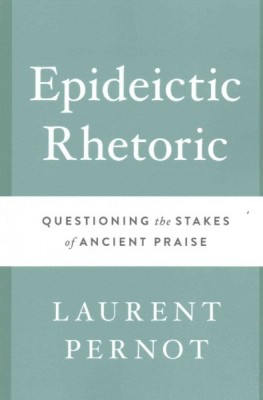| Epideictic Rhetoric: Questioning the Stakes of Ancient Praise Contributor(s): Pernot, Laurent (Author) |
|
 |
ISBN: 1477311335 ISBN-13: 9781477311332 Publisher: University of Texas Press OUR PRICE: $18.95 Product Type: Paperback - Other Formats Published: June 2015 |
| Additional Information |
| BISAC Categories: - Language Arts & Disciplines | Rhetoric - Literary Criticism | Ancient And Classical |
| Dewey: 808 |
| Series: Ashley and Peter Larkin Series in Greek and Roman Culture |
| Physical Information: 0.6" H x 5.5" W x 8.4" (0.10 lbs) 182 pages |
| Themes: - Chronological Period - Ancient (To 499 A.D.) |
| Descriptions, Reviews, Etc. |
| Publisher Description: Speeches of praise and blame constituted a form of oratory put to brilliant and creative use in the classical Greek period (fifth to fourth century BC) and the Roman imperial period (first to fourth century AD), and they have influenced public speakers through all the succeeding ages. Yet unlike the other classical genres of rhetoric, epideictic rhetoric remains something of a mystery. It was the least important genre at the start of Greek oratory, but its role grew exponentially in subsequent periods, even though epideictic orations were not meant to elicit any action on the part of the listener, as judicial and deliberative speeches attempted to do. So why did the ancients value the oratory of praise so highly? In Epideictic Rhetoric, Laurent Pernot offers an authoritative overview of the genre that surveys its history in ancient Greece and Rome, its technical aspects, and its social function. He begins by defining epideictic rhetoric and tracing its evolution from its first realizations in classical Greece to its eloquent triumph in the Greco-Roman world. No longer were speeches limited to tribunals, assemblies, and courts--they now involved ceremonies as well, which changed the political and social implications of public speaking. Pernot analyzes the techniques of praise, both as stipulated by theoreticians and as practiced by orators. He describes how epideictic rhetoric functioned to give shape to the representations and common beliefs of a group, render explicit and justify accepted values, and offer lessons on new values. Finally, Pernot incorporates current research about rhetoric into the analysis of praise. |
Contributor Bio(s): Pernot, Laurent: - Laurent Pernot is Professor and Chair of the Department of Greek at the University of Strasbourg, Director of the Center for the Analysis of the Religious Rhetorics of Antiquity, Member of the Institut de France (Académie des Inscriptions et Belles-Lettres), and former President of the International Society for the History of Rhetoric (ISHR). His many publications include Rhetoric in Antiquity and New Chapters in the History of Rhetoric. |